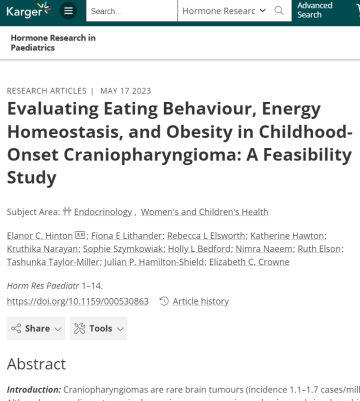Eating behaviour and childhood onset craniopharyngioma
- 19 June 2023
Researchers have confirmed a link between hyperphagia – an abnormally strong desire for food – and body mass index (BMI) in patients affected by childhood onset craniopharyngioma. A paper published in Hormone Research in Paediatrics demonstrates that eating behaviour research would be both feasible and acceptable in this patient group.
Craniopharyngiomas are rare brain tumours. They are non-malignant and have high survival rates but can affect a patient’s vision and their endocrine system (a system responsible for hormone regulation and release). This includes causing hypothalamic obesity, a type of obesity caused when a part of the patient’s brain called the hypothalamus doesn’t function normally.
Because hypothalamic obesity is such a common feature of childhood craniopharyngioma, the study team wanted to assess whether this young patient group would tolerate and accept work around food-related behaviours. They also wanted to explore whether it would even be possible to recruit patients to carry out this type of research.
Researchers recruited 11 patients who all had childhood-onset craniopharyngioma. All patients had undergone surgery while some had also received radiotherapy. After an overnight fast, participants underwent a series of assessments (body composition, resting metabolic rate, etc). They also completed several questionnaires and were provided with lunch during which they could eat as much as they wanted.
The study team found evidence to suggest that young people with craniopharyngioma experience enjoyment from their food. However, in some cases, this heightened responsivity to food could lead to problematic behaviours, such as stealing food or anger outbursts if access to food was removed.
These findings suggest that food approach behaviours, including food responsiveness and enjoyment of food, have the strongest links with children’s body mass index standard deviation scores (BMI-SDS). BMI-SDS is a way of using population data to standardise BMI for children and adolescents because BMI values, which are used to classify whether an adult is overweight or obese, don’t work for children. Thus, food approach and avoidance behaviours may be useful targets for interventions to manage obesity in this patient group.
Dr Ella Hinton, lead author, said:
“Future research should investigate how specific food-related behaviours may change over time, from pre to post surgery, depending on factors such as hypothalamic damage.
“Food approach behaviours may be useful targets for interventions to help patients with their eating. For example, food-related, response inhibition training has been shown to reduce consumption of high energy dense foods in adults and children.
“Conversely, encouraging food avoidance behaviours, such as slowness in eating or responsiveness to satiety, may also serve to reduce food intake and improve health-related quality of life.”
